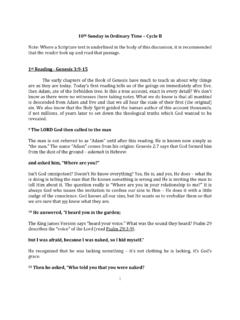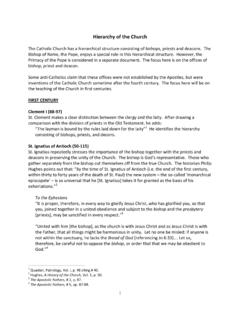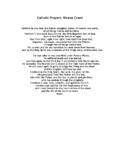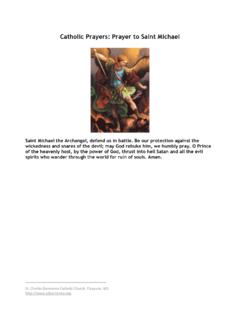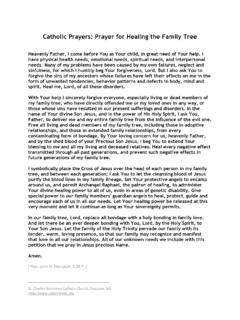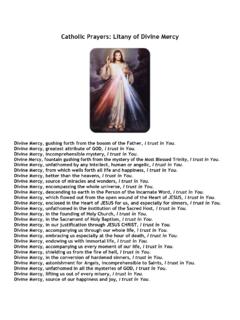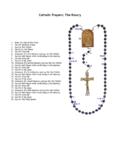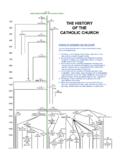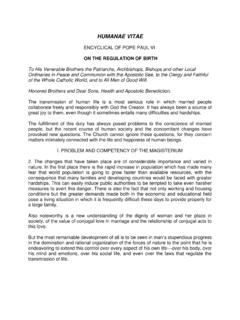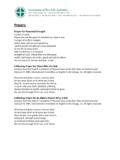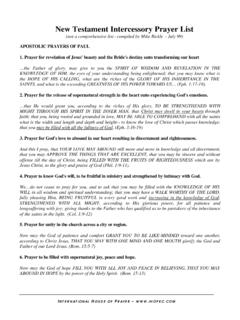Transcription of 32nd Sunday in Ordinary Time - Cycle B
1 32nd Sunday in Ordinary time Cycle B. Note: Where a Scripture text is underlined in the body of this discussion, it is recommended that the reader look up and read that passage. 1st Reading - 1 Kings 17:10-16. What we now know as 1 and 2 Kings is designated in older Catholic Bibles as 3 and 4. Kings. Likewise, what we know as 1 and 2 Samuel is called 1 and 2 Kings in the older Catholic Bibles. This is because in the Hebrew Bible a division was made between the books of Samuel and Kings while the Septuagint (Greek translation) had only one division called the books of kingdoms . Protestant Bibles, because the followed the Hebrew canon have always had 1 and 2 Samuel followed by 1 and 2 Kings; just as they have always been missing the seven Old Testament books unique to the Septuagint (and Catholic Bible). The books of 1 and 2 Kings in all modern Bibles are a compilation from various sources which record: 1) The last days of king David and the enthronement of Solomon (1 Kings 1 and 2).
2 2) The reign of king Solomon; his wisdom, the building of the temple, and the visit of the Queen of Sheba (1 Kings 10:1-13). 3) Solomon's fall and death (1 Kings 11). 4) The division of the kingdom under Solomon's son Rheoboam, and the history of the 2 kingdoms of Israel and Judah until the fall of Samaria and the extinction of the kingdom of Israel (1 Kings 12 through 2 Kings 17). 5) The history of the kingdom of Judah until the Babylonian captivity in 586 (2. Kings 18-25). 1st and 2nd Kings actually form one continuous book. Hebrew tradition holds that this compilation was done by the Prophet Jeremiah (562-539 ) during the Babylonian captivity. It was written for the Jews who had witnessed the catastrophe of 586 and for their children whose faith was wavering. It was intended to instruct and encourage them, to elicit from them acts of repentance for their past sins, and to renew their hopes for the future.
3 It instructs the exiles by demonstrating that Israel, through her kings, has been unfaithful to the covenant, and that God, far from being unfaithful to his part of the covenant, has remained faithful and patient with erring Israel long after Israel's infidelity. God's covenant is a holy family bond which cannot be annulled or retracted. The author returns repeatedly to the promise of perpetuity made to the Davidic dynasty, the Temple, and Jerusalem. It is upon the fulfillment of these promises that Israel must place her hopes for the future. Today's reading comes from the account of Elijah, Ahab, and the three year drought and is a prediction-fulfillment story. 1. 10 [In those days, Elijah the prophet] left and went to Zarephath. Zarephath is a Sidonian town a territory acknowledged as Baal's, not Yahweh's. Yet, the power of Yahweh has caused drought even there. As he arrived at the entrance of the city, a widow was gathering sticks there; he called out to her, Please bring me a small cupful of water to drink.
4 11 She left to get it, and he called out after her, Please bring along a bit of bread. 12 As the lord , your God, lives, she answered, I have nothing baked; there is only a handful of flour in my jar and a little oil in my jug. Just now I was collecting a couple of sticks, to go in and prepare something for myself and my son; when we have eaten it, we shall die.. 13 Do not be afraid, Elijah said to her. Go and do as you propose. But first make me a little cake and bring it to me. Then you can prepare something for yourself and your son. 14 For the lord , the God of Israel, says, The promise The jar of flour shall not go empty, nor the jug of oil run dry, until the day when the lord sends rain upon the earth.' 15 She left and did as Elijah had said. She was able to eat for a year, and he and her son as well; 16 The jar of flour did not go empty, nor the jug of oil run dry, as the lord had foretold through Elijah.
5 The fulfillment. Although He caused the drought, Yahweh protects those whom He favors with miraculous food similar to manna (see Numbers 11:8). 2nd Reading - Hebrews 9:24-28. Last week we looked at Chapter 7 as background for the reading. This week we must race through chapters 8 and 9 to gain the background: 8:1 The main point of what has been said is this: we have such a high priest, who has taken his seat at the right hand of the throne of the Majesty in heaven, 2 a minister of the sanctuary and of the true tabernacle that the lord , not man, set up [we have a priest and a king, we have a priest-king]. 3 Now every high priest is appointed to offer gifts and sacrifices; thus the necessity for this one also to have something to offer [Jesus offers His glorified body on the ark of the covenant in heaven (Revelation 5:6)]. 4 If then he were on earth, he would not be a priest, since there are those who offer gifts according to the law [the Levites].
6 5 They worship in a copy and shadow of the heavenly sanctuary, as Moses was warned when he was about to erect the tabernacle. For he says, See that you make everything according to the pattern shown you on the mountain [see Ezekiel 36:26]. 6. Now he has obtained so much more excellent a ministry as he is mediator of a better covenant, enacted on better promises. 7 For if that first covenant had been faultless, no place would have been sought for a second one. 8 But he finds fault with them and says: [what follows is quoted from Jeremiah 32:31-34 (Hebrews 8:8-12); the longest Old 2. Testament quotation in the New Testament. It is also the only Old Testament text where the new covenant is specifically mentioned] Behold, the days are coming, says the lord , when I will conclude a new covenant with the house of Israel and the house of Judah. 9 It will not be like the covenant I made with their fathers the day I took them by the hand to lead them forth from the land of Egypt; for they did not stand by my covenant and I ignored them, says the lord [this is quoted from the Greek (Septuagint).]
7 The Hebrew says I became their master . Recall that after the golden calf, man no longer had a father-son relationship with God but rather a master-slave relationship]. 10 But this is the covenant I will establish with the house of Israel after those days, says the lord : I will put my laws in their minds and I will write them upon their hearts [see Ezekiel 36:26. where stony heart refers to the 10 commandments written on stone and heart of flesh is the new covenant laws of love which are written on the heart]. I will be their God [their Father], and they shall be my people [my family]. 11 And they shall not teach, each one his fellow citizen and kinsman, saying, Know the lord ,' for all shall know me, from least to greatest. 12 For I will forgive their evildoing and remember their sins no more. 13 When he speaks of a new covenant, he declares the first one obsolete. And what has become obsolete and has grown old is close to disappearing.
8 9:1 Now (even). the first covenant had regulations for worship and an earthly sanctuary. 2 For a tabernacle was constructed, the outer one, in which were the lampstand, the table, and the bread of offering; this is called the Holy Place. 3 Behind the second veil was the tabernacle called the Holy of Holies, 4 in which were the gold [Gold signifies royalty. The gold described here is in the Holy of Holies, the divine place] altar of incense and the ark of the covenant entirely covered with gold. In it were the gold jar containing the manna, the staff of Aaron that had sprouted, and the tablets of the covenant. 5 Above it were the cherubim of glory overshadowing the place of expiation. Now is not the time to speak of these in detail. 6 With these arrangements for worship, the priests, in performing their service, go into the outer tabernacle repeatedly, 7 but the high priest alone goes into the inner one once a year, not without blood that he offers for himself and for the sins of the people.
9 8 In this way the holy Spirit shows that the way into the sanctuary had not yet been revealed while the outer tabernacle still had its place [the old covenant. It is human, natural, physical, external, bodily. Internal transformation is needed to make it golden] (which is symbolic for the present age) [A time of transition between the old and new covenants. 40 years ( 30 Christ is crucified, the temple {old covenant} is destroyed)]. 9 This is a symbol of the present time , in which gifts and sacrifices are offered that cannot perfect the worshiper in conscience [the old covenant is not effective this implies that the new covenant is] 10 but only in matters of food and drink and various ritual washings: regulations concerning the flesh, imposed until the time of the new order [external regulations which perfect the body but not the soul]. 11 But when Christ came as high priest of the good things that have come to be, passing through the greater and more perfect tabernacle not made by hands, that is, not belonging to this creation, 12.
10 He entered once for all into the sanctuary, not with the blood of goats and calves [the requirement for Aaron and his sons when first ordained as high priest (Leviticus 8)] but with his own blood, thus obtaining eternal redemption [the old covenant gave earthly 3. redemption]. 13 For if the blood of goats and bulls and the sprinkling of a heifer's ashes can sanctify those who are defiled so that their flesh is cleansed, 14 how much more will the blood of Christ, who through the eternal spirit [the Holy Spirit] offered himself unblemished to God, cleanse our consciences from dead works to worship the living God [the old covenant purified persons by sprinkling the new covenant purifies through drinking (the Eucharist)]. 15 For this reason he is mediator of a new covenant: since a death has taken place for deliverance from transgressions under the first covenant, those who are called may receive the promised eternal inheritance.
